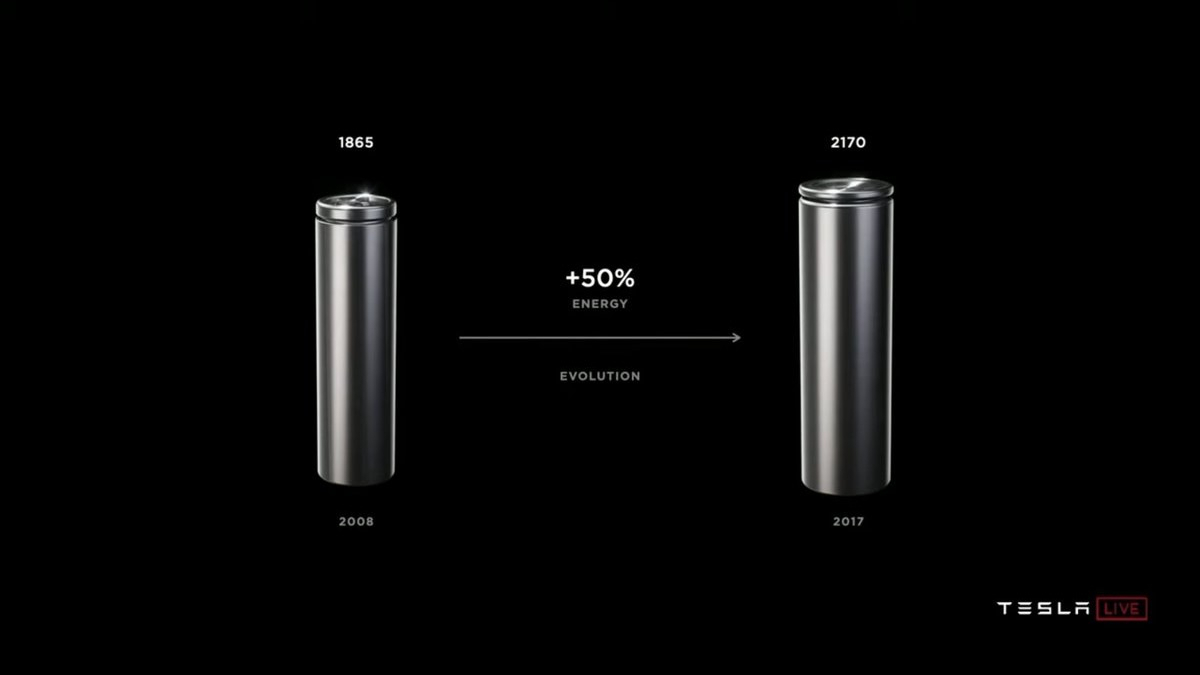 |
This image from Tesla's Battery Day 2020 demonstrates the evolution from the 1865 battery format introduced in 2008 to the larger 2170 format in 2017, with a 50 percent increase in energy storage, which enabled longer vehicle ranges without a proportional weight increase. (Tesla) |
South Korean battery material companies are emerging as key players in Tesla's revamped supply chain as the carmaker upgrades its 2170 battery cells -- integral to its most popular models.
Tesla's initiative to enhance battery performance centers on upgrading the anode and cathode materials, which are critical for improving energy density and charging speeds. The anode, which determines how much energy the battery can store, directly impacts the driving range of electric vehicles. Meanwhile, the cathode influences how quickly the battery can be charged.
In its new 2170 batteries, Tesla plans to use anode materials with a higher nickel content, specifically targeting 90 to 95 percent nickel. According to industry sources, Korean battery materials company L&F is preparing to supply these high-nickel anodes. L&F announced during its first-quarter earnings call this year that it will start mass production of this upgraded anode material by year-end. These anode materials will be utilized in 2170 batteries produced by LG Energy Solution and supplied to Tesla.
"Tesla is likely asking suppliers to source materials outside of China and Taiwan to reduce geopolitical risks from the IRA. And this shift is benefiting Korean companies," Chung Won-seok from Hi Investment & Securities. Bloomberg also reported earlier this year that Tesla is avoiding sourcing from China and Taiwan to manage IRA risks.
Tesla's revised 2170 battery will also feature new cathode materials, reportedly sourced from Korea. The company aims to integrate a silicon-based cathode material, shifting away from its previous reliance on Chinese materials. Daejoo Electronic Materials, the only Korean company capable of mass-producing silicon cathode materials, is the likely candidate to supply these components.
Silicon cathode materials offer significantly higher capacity -- ten times that of traditional graphite-based cathodes -- facilitating faster charging times. Daejoo Electronic Materials, already a supplier to EVs from Porsche and Audi, has increased the silicon content in its cathodes from 5 to 8 percent, a development that has caught Tesla's interest.
"Silicon cathode materials are gaining attention as a next-generation solution due to their superior capacity and faster charging and discharging speeds compared to graphite. These materials are likely to be adopted by various original equipment manufacturers and battery makers for their next-generation products," said researcher Lee Hyun-wook from IBK Securities.
Officials from L&F and Daejoo Electronic Materials declined to comment on these developments.
The 2170 cylindrical battery is currently Tesla's most widely used cell type, found in the Model 3 and Model Y vehicles. While Tesla is developing the next-generation 4680 batteries, they are not yet in full-scale production. The 2170 cells, initially co-developed with Panasonic, contain nickel-cobalt-aluminum cathode chemistry and are integral to Tesla's current battery architecture. Some Model 3 and Model Y vehicles also use cheaper 2170 lithium iron phosphate cells produced by CATL, or 2170 cells manufactured by LG Energy Solution at its Ochang plant in Korea.
Despite announcing ambitious plans during Battery Day 2020 to produce its own batteries, Tesla has faced challenges in achieving mass production of the high-performance 4680 cells. According to industry sources, the company has reportedly ordered $4.3 billion worth of electrode materials from LG Energy Solution, indicating an ongoing reliance on external suppliers. Making electrode materials is a critical part of battery production.
“We’re currently in talks with Tesla about the supply and contract for the 4680 battery, which indicates we’re moving towards mass production,” said an official from LG Energy Solution.
“Regarding the electrode supply contract with Tesla, it’s difficult to confirm details related to our customer.”







![[Herald Interview] How Gopizza got big in India](http://res.heraldm.com/phpwas/restmb_idxmake.php?idx=644&simg=/content/image/2024/11/20/20241120050057_0.jpg)